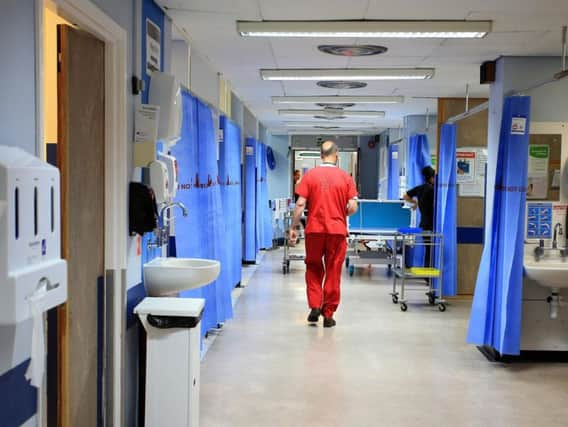Scottish care home resident left dead in room for 24 hours amidst 'serious' GP shortage


The shocking case from earlier this year was revealed followed a warning from Scottish doctors that out-of-hours GP service nationwide is failing due to a lack of staff.
Just one in five GPs is willing to work out-of-hours, with heavy workloads in family practices resulting in most refusing to take on weekend and nighttime work, whilst some out-of-hours centres have been forced to close due to a shortage of doctors.
Advertisement
Hide AdAdvertisement
Hide AdOne GP from Glasgow, Ronnie Burns, works at a busy health centre and does weekend shifts at the out-of-hours centre at Victoria Infirmary once a fortnight.
He recalled starting a weekend shift earlier this year when he was told that no doctor had been able to visit a care home where a resident had died, to certify them dead.
He said: “The care home was left with the dead resident for 24 hours.
He added how much it had upset the staff, saying: “They remember it well, months later.”
Doctors are now warning of a crisis as the few remaining GPs struggle on with overflowing waiting rooms.
Dr Andrew Buist, chairman of the British Medical Association GP committee, said: “There is a chronic shortage of GPs during normal daytime surgeries. The evening and weekend shortage is a serious problem.
“Being a GP with the increasing list of patients and burden of paperwork is much less attractive than it was previously.
“The incentive to work overtime for nothing after an exhausting 10 or 11-hour day in a surgery is not there. Understandably, they want to be home with their families.”
Advertisement
Hide AdAdvertisement
Hide AdDue to the drop in GPs signing up for out-of-hours shifts, the services have been reduced to emailing local GPs on a Friday, asking if anyone is available to work at the weekend.
Scotland’s out-of-hours GPs are based in centres, where teams are divided into those taking surgeries and those on house calls.
Drop in out-of-hour GPs, rise in waiting times
Plummeting out-of-hours GP figures may also result in long waits for patients before an out-of-hours doctor can come to see them at their home.
“At its worst, usually after busy weekend shifts, people can be left waiting 24 hours but on the whole it is still functioning,” said Dr Burns.
“I’ve had two shifts in the last six months where I was seeing patients at home who had called for a doctor the previous day.”
He added the system is now stretched to the point where it is not safe: “When it works, it works well. It’s not good when it overflows. It is now, at times, not safe and we need to look at what needs to be done.
“My average is 10 house calls over six hours but can be up to 14, while making life-and-death decisions.
Out-of-hours services are the responsibility of the Scottish Government.
Advertisement
Hide AdAdvertisement
Hide AdA Scottish Government spokesperson said: “We have a record number of GPs working in Scotland and we are committed to increasing numbers by at least 800 in the next 10 years. We are also investing an additional £250 million in direct support of general practice by 2021.”
A spokesperson for Greater Glasgow and Clyde said: “We are aware that GP out-of-hours services are busy and that is why we have developed a campaign to remind patients that they should not attend a GP out-of-hours service before calling NHS 24.
“There are developments under way in primary and community services which will offer people a wider range of choice in terms of getting support out-of-hours. We are taking steps to increase resilience to reduce the reliance on medical staff.”
Solutions
The Scottish Government has announced the tariff paid to GP practices for teaching undergraduates is to rise from £40 to £85 a session – with the funding for this coming from an additional £5 million being invested before the end of this parliament.
Evidence shows that training within a practice during medical school increases the likelihood of students going on to become a GP. The change is being introduced in the wake of a report by the Increasing Undergraduate Education In Primary Care Review Group, which was chaired by Professor John Gillies.
Health Secretary Jeane Freeman said: “I am grateful to Professor Gillies and the Review Group for this report and fully endorse its recommendations. It is only right that GP practices are properly funded for covering the cost of teaching medical students. Implementing the recommendations from this report is part of a range of actions we are taking to ensure we deliver the GP workforce we need.
“We will have increased medical school places by 190 in total by 2021 – a rise of 22% from 2016 levels. In addition, we are widening access opportunities to study medicine in Scotland, ensuring that more medical school places are offered to Scottish students so they have the opportunity to pursue a career here.”
In August a report by Audit Scotland warned plans to increase the number of GPs in Scotland face “significant challenges”. It said the government would struggle to meet its commitment to recruit an extra 800 family doctors over the next decade.
Advertisement
Hide AdAdvertisement
Hide AdAuditor General Caroline Gardner said: “They’ve made a number of commitments to train additional GPs, physios, pharmacists and so on – and those commitments are on track – but it is not clear those commitments will turn into the GPs and other professionals who need to be there in primary care practices as this change is happening.”
Her report described workforce planning as “fragmented.”